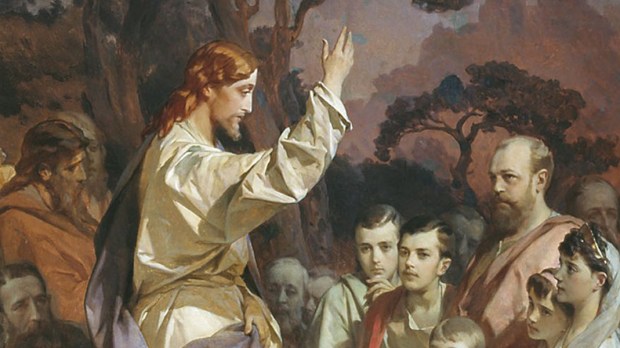Getting even, some might say, is just part of being human. After all, doesn’t the Bible say, “An eye for an eye …”?
And yet, when we stop and think about the teachings of Jesus, but more especially look at how he treated others—including his attitudes towards those who tortured and killed him—we see that he wants those who are his followers to act in a way that is very different from that imagined by those who are wise in the ways of the world. “Giving as good as you got” or seeking retribution can have no part in the Christian life, particularly when we consider the dominant message in Readings for this Seventh Sunday in Ordinary Time.
In this Sunday’s Gospel—which forms an important part of St. Luke’s “Sermon on the Plain”—Jesus continues the series of teachings we heard this past Sunday.
Moving from the Beatitudes and the promises God makes to those who live according to the demands of discipleship, Jesus begins a series of difficult teachings on how we should love our enemies and avoid judging others.
As theologian José A. Pagola has observed, “From his experience of a non-violent God, Jesus proposes a nonviolent practice of resistance to injustice. This means living in unity with a God whose heart is not violent but compassionate … He simply suggests a way of acting that tests the limits of the possible. He does this by proposing specific situations that graphically show how to react against evil: Do not [violently] resist an evildoer. But if anyone strikes you on the right cheek, turn the other also; and if anyone wants to sue you and take your coat, give your cloak as well; and if anyone forces you to go one mile, go also the second mile.’”
In the end, Pagola reflects, Jesus’ desire for his followers is to help make the Reign of God a reality in the world by combating evil and injustice responsibly and courageously, because God’s Reign demands that we live lives of love and compassion.
Reflecting on this theme, Pope Benedict XVI remarked, “Love of one’s enemy constitutes the nucleus of the ‘Christian revolution,’ a revolution not based on strategies of economic, political or media power: the revolution of love, a love that does not rely ultimately on human resources but is a gift of God which is obtained by trusting solely and unreservedly in his merciful goodness. Here is the newness of the Gospel which silently changes the world! Here is the heroism,” Pope Benedict concludes, “of the ‘lowly’ who believe in God’s love and spread it, even at the cost of their lives” (Angelus, February 18, 2007).
These are hard lessons, especially for those who have suffered much. The idea of making others “pay” for our pain, loss, or disappointment is a way to try to soothe hurt feelings. But this isn’t the way that is modeled by our Crucified King. In fact, when we think about Jesus’ very clear instruction that we are to “love” our enemies, we have to ask ourselves a very hard question: if I love someone, how can I also say that they are my enemy?

Read more:
Did the Church change its teaching on the death penalty?
While we are all called to be people of forgiveness and mercy, we also recognize that there is a big difference between forgiveness (the conscious choice to look beyond the hurt and to not be controlled by the situation or individual who has hurt us) and reconciliation (which represents a total healing of broken relationships, a sort of “beginning again,” as it were).
While reconciliation is not always possible or even healthy (especially if we have been abused or exploited), Jesus calls us all to forgiveness and to seeking a way forward, together. After all, we might say that refusing to forgive means that we’re choosing to remain in the pain, allowing the past to still dominate our present. Here again, we have to look to the model of Jesus, especially if we find ourselves challenged by the idea of forgiveness and reconciliation.
In the end, as it was with David and Saul in the First Reading, we are being invited to look for opportunities for bridge-building and even reconciliation when it is at all possible: “Give, and gifts will be given to you; a good measure, packed together, shaken down, and overflowing, will be poured into your lap. For the measure with which you measure will in return be measured out to you.”
What would it mean for you to pray for those who have hurt you or caused you pain? Can you ask God to bless them? Would you want to be “measured” by God in the same way that you “measure” others? Ask the Lord to help you move to a place of forgiveness. Reflect on the difference between reconciliation and forgiveness and ask the Lord to help you open your heart to the possibility of reconciliation, for the sake of the Kingdom of Heaven.
Words of Wisdom: “If anyone should ask you what are the most radical words in the gospel, you need not hesitate to reply: ‘Love your enemies.’ It is these words that reveal to us most clearly the kind of love proclaimed by Jesus. In these words we have the clearest expression of what it means to be a disciple of Jesus.” –Henri Nouwen

Read more:
Jesus asks uncomfortable, embarrassing questions, says pope

